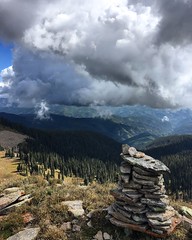At the tail end of last year I wrote a very brief blog post after finding out that there was a proposal to build a large wind farm on the edge of Rannoch Moor. The application for the Talladh-a-Bheithe wind farm has now been submitted. This is for twenty four wind turbines, each 410 feet high. The location is between Lochs Rannoch and Ericht, slap bang in the middle of one the finest landscapes in the UK.
The excellent Keep Rannoch Wild website has far more information than I can include in this post. I recommend that you follow this link here to have a look at what is proposed and the impact that it will have.
If you object to this development in the midst of such an iconic landscape I urge you to spend a few minutes making that objection known. A letter outlining your objections does not have to be big, long or clever. Just write what you think about the proposals. Details of how to do this is on the Keep Rannoch Wild Website.
Whilst my dinner was in the oven this evening I fired off a letter, twenty minutes and the job was done. This is my effort. Every objection counts.
Energy Consents and Deployment Unit
Scottish Government
4th Floor
5 Atlantic Quay
150 Broomielaw
Glasgow
G2 8LU
Dear Sir / Madam
Application for a Windfarm at Talladh-a-Bheithe, Rannoch.
I write to object to the above application by Eventus Duurzaam BV for consent under Section 36 of the Electricity Act 1989 to construct a windfarm on a site at Talladh-a-Bheithe, Rannoch.
The word ‘Rannoch’ in my mind sums up all that is special about the Scottish Highlands. The word alone bring images of wide open landscapes, a place to escape from the hustle and bustle of the modern world.
On the 1st August 1997 my love affair with the Scottish Highlands started on the hills, moors and mountains of the Central Highlands. I caught a train to Rannoch station and with a heavy rucksack set out on the long walk to the isolated bothy that is located below the southern slopes of Ben Alder. Over the next couple of days I climbed Ben Alder itself along with many of the surrounding hills. I eventually caught the train home from Corrour station.
As a city dweller what struck me was the sense of scale and space. I had never experienced a landscape that was both so large and empty. The scale took my breath away. I could not believe that on such a small crowded island you could stand on a mountain that was a whole days walk from the nearest road. That mountain was Ben Alder and from the summit there was literally no sign of human interference. Not wilderness in the purest sense but about as wild as it is possible to get in the UK.
The fact that the date of this trip is recorded re-enforces the impression the area had on me.
Those few days in the Rannoch area kindled an obsession with the mountains and remoter corners of the Scottish Highlands. Over the following years I have visited the Rannoch area many times. The main reason for returning is the freedom to walk and camp amongst such a large and unspoilt landscape.
I am therefore saddened to hear of an application to place twenty four moving structures, each 410 feet high right in the middle of such an iconic area. Rannoch is to many people the heart of the Highlands. The walk that I did all those years ago would if the application was given the go ahead be dominated by not only the turbines but the infrastructure such as roads that will need to be constructed.
If the turbines were built I do not think that there would be a reason for many tourists to visit. I doubt that I could return. What would happen to the many small businesses that cater for hillwalkers and mountaineers in this isolated area?
Scottish Government planning policy aims to support renewable energy developments but not at any cost and not indiscriminately at any location. Schedule 9 of the Electricity Act places on the ‘developer’ a duty to have regard to the desirability of preserving natural beauty, and the current Scottish Planning Policy (June 2014) states ‘Wild land character is displayed in some of Scotland’s remoter upland, mountain and coastal areas, which are very sensitive to any form of intrusive human activity and have little or no capacity to accept new development. Plans should identify and safeguard the character of areas of wild land as identified on the 2014 SNH map of wild land areas.’ In my view this guidance applies fully to the proposed site which lies within the ‘Wild Land Area 14’ on the 2014 SNH map: mitigation would make little difference in this case due to the topography, and the visual intrusions into magnificent scenery would be too great a price to pay.
As the proposed development is within Wild Land Area 14 of the SNH 2014 map and is on the edge of the Rannoch and Glen Lyon National Scenic Area, this proposal should not be allowed to proceed.
Wild land is a valuable asset that should be cherished. This is an inappropriate setting for a large-scale industrial site. I therefore urge that you reject this planning application.
Yours faithfully,
James Boulter




